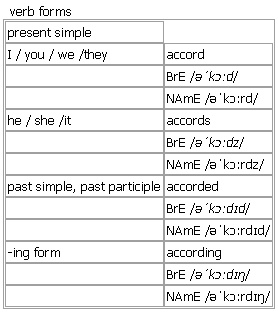 accord
accord

ac·cord [accord accords accorded according] noun, verb BrE [əˈkɔːd] NAmE [əˈkɔːrd]
noun
a formal agreement between two organizations, countries, etc
•The two sides signed a peace accord last July.
Word Origin:
Old English, from Old French acorder ‘reconcile, be of one mind’, from Latin ad- ‘to’ + cor, cord- ‘heart’; influenced by ↑concord.
Example Bank:
•A peace accord was reached on 26 March.
•They signed a trade accord with the Americans.
•a trade accord between Europe and the United States
•an accord on environmental protection
•The US-Canada free trade accord has come under political scrutiny.
•The countries drew up accords on economic and technical cooperation.
Idioms: ↑in accord ▪ ↑of your own accord ▪ ↑with one accord
verb (formal)
1. transitive to give sb/sth authority, status or a particular type of treatment
•~ sth to sb/sth Our society accords great importance to the family.
•~ sb/sth sth Our society accords the family great importance.
2. intransitive ~ (with sth) to agree with or match sth
•These results accord closely with our predictions.
•His views accord with public opinion.
•We ensure that our goods accord with modern standards.
Verb forms: 
Word Origin:
Old English, from Old French acorder ‘reconcile, be of one mind’, from Latin ad- ‘to’ + cor, cord- ‘heart’; influenced by ↑concord.
Example Bank:
•His version of events does not accord fully with the facts.
•There were complaints about the special treatment accorded to some minority groups.
|
|
